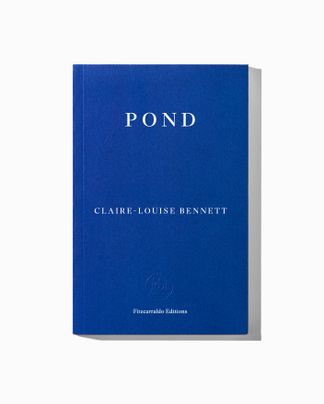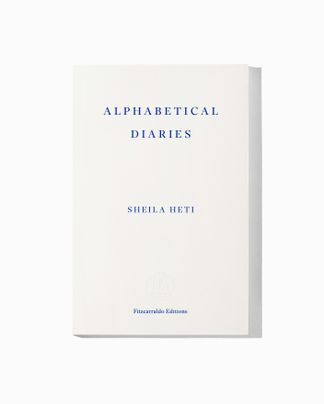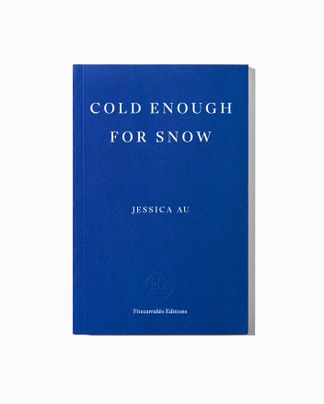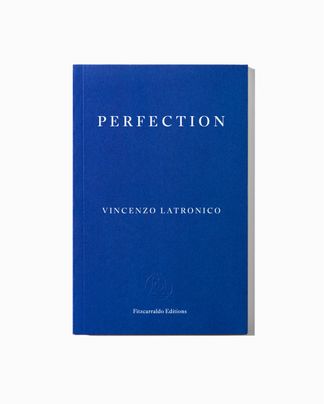In the middle of the countryside, a realtor is showing a disgraced professor around an idyllic house. She speaks not only about the home’s many wonderful qualities but about its previous owner, the mystifying Helen, whose presence still seems to suffuse every fixture. Through hearing stories of Helen’s chosen way of living, the man begins to see that his story is not actually over – rather, he is being offered a chance to buy his way into the simple life, close to the land, that’s always been out of reach to him. But as evening fades into black, he will learn that the asking price may be much higher, and stranger, than anticipated. Philosophically and formally adventurous, at once intimate and cosmic in scope, Helen of Nowhere asks: what must we give up in exchange for true happiness?
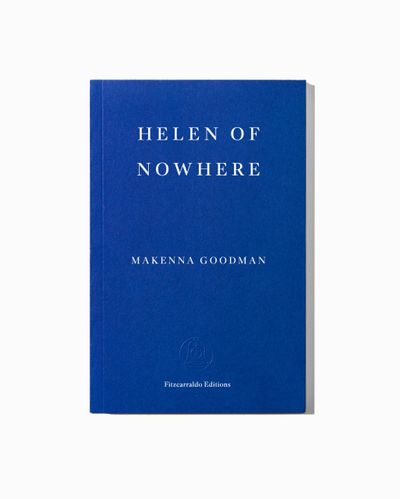
Helen of Nowhere
French paperback with flaps, 160 pages
Published 29 January 2026
Helen of Nowhere
ACT 1
MAN
I think it’s okay to tell a woman she’s beautiful once a year. Any more than that and her life will be about being beautiful, entirely. Anything less and she’ll feel a lack of love and attention. My wife always said I never told her she was beautiful enough. But like I said, I don’t think it’s good for women.
Someone told me that life is a collection of details you choose to pay attention to. Most of my life has been taken up by my work, but since my work has always been about observing nature, I consider my life’s work all about paying attention. This is what I told my students: The world is to be observed, and observing for its own sake is a life worth living.
The house, for example, was warm, despite its being unfurnished, with simple wooden features and beams containing echo strokes of a handheld chisel. There was a built-in couch with a dark blue fabric cushion, its edges sewn by hand, somehow both right-angled and arched in a crescent shape. Beside it, an ornate cast iron wood stove. The windows were large, single-paned. There was a piece of upright wood in the corner, a gnarled tree or trunk that had been elevated into something sculptural. Besides that, nothing but gleaming, empty space.
I was in the middle of nowhere. I was looking for a simpler life. I had driven all day, alone, to get there.
Everything had become so useless and vast, like acres and acres of lodged wheat.
My life had been lived in tune with one philosophy, which is this: within nature exists the divine. That’s all. And because the tools of human construction have warped the meaning of things like songbirds, it is the work of teachers—and people—to remove our constructions, and upon their removal, invoke our innate ability to engage in simply being. Nature is the teacher, not I, is what I always told my students.
I built my department from scratch around this beautiful idea. We read and wrote, but the greatest work of all was to remove ourselves from the politics of the city and allow the voice of nature to speak to us, through us. Through the act of such communion, our own true nature might reveal itself. We wrote for ourselves and also as a way to translate nature’s teachings for others. It was enough to witness the patterns of plants, the footprints of deer, the movement of grasses in the wind. This witnessing led to the transcendence of the human spirit.
My program was lauded for its experiential approach, and as such, funding was never hard to find. For years we cultivated a transformative practice through a curriculum combining time spent in natural spaces alongside the study of texts left by humble thinkers who spoke lovingly of the earth and the desires of the heart. I would take students out to wild places around the city, separate them, and alone they would observe, for three full days and two full nights with basic food and rudimentary shelter – no matter the weather or risk – the divine relationships in nature and the thoughts that were born.
Time passed.
And with it came a new generation of teachers.
Women, who were critics, and who encouraged others to be critical too.
Critical of me, among other subjects. Of my work. I don’t think I am wrong to say that they took a special pleasure in criticizing my field of interest.
Who is allowed to feel at home in this so-called nature, they asked, and what are the conditions informing the peace provided those people by the simplicity I espoused? The new generation of teachers said that my approach to teaching was a purity test, the imposition of ritualized discomfort in nature as a means of cultivating virtue.
They questioned my methods.
They rejoiced to find in my hunt for simplicity and silence a complexity of ambition and prejudice. But in their own hunt for complexity, they were oversimplifying.
I had nothing against women.
In fact, I loved women. I’d worked hard for women my entire life.
It just so happened these new teachers were women. I swear it didn’t factor at all into my disdain for them. I didn’t like to think of myself as a man, even, as I was so much more than just man. But they were times of taxonomy.
One of these women accused me of overidentifying with my work. She was a writer who gave a captivating performance at faculty meetings. I found her prose was good at the sentence level, but her vision was still developing. She pointed out problems with my thinking. She wanted to discuss everything on a structural level. Our colleagues found her funny. She was magnetic, self-absorbed, convincing in her beliefs, arrogant in her delivery, annoying, reductive. She interrupted me, she disliked me.
She was successful, widely praised.
And she was close friends with my wife.
Three years, and I had been drinking.
My wife was, at one time, a very beautiful woman. But over time, her beauty faded, and with it went her desire for me. There were so many years of notoriety that had held us together, my success, her adoration, my appreciation, the agreements we had made.
It likely wasn’t fair of me to see her beauty as fading, it would have been fairer to see it as maturing, and yet if I’m being honest it really did look to me as though it were withering not ripening.
At first the changes in my position were devastating, even though they were largely ideological. It wasn’t violent, but quiet. My wife and I would weep gently in each other’s arms.
And yet with time, the lower I felt, the brighter she became, though to me that brightness felt punishing, like exiting a theatre at midday.
I had lost everything. And at the beginning, she felt she had lost everything too. It was a shared loss that at first brought us closer together. There wasn’t a way for us to remain viable without my career, we told ourselves. It was what provided us an excuse to remain in tandem. The university was our container, it was where we had met, it was where we had formed.
But I had died.
That is, I became dead. To the world, and to me.
And yet she was alive, my wife said.
Her dog enjoyed my spot on the bed.
She would caress it while I lay far out, pushed to the edge. Such gazing, such devotion. She would invite it on the blanket and rub its long, blond ear.
Early in my career I taught a nature writing class to a small number of students, each of whom was meant to research a plant that interested them.
Every meeting we would discuss a different student’s work by performing a collective interrogation, all of us asking one student questions rapidly in succession about their plant and their pasts as a way to access something deeper. The student in question would become flustered and exposed, providing an opening for their subconscious to emerge. These questions and answers, paired with a botanical inquiry into the plant they had chosen, culminated in a lyrical theory of each student’s driving inquiry, which was eventually revealed. This aided them in their writing – it gave them a root.
One of my students was beautiful.
(…)
‘Wildly original… unpredictable and funny…. Is Helen of Nowhere a ghost story? A satire about back-to-the-land philosophies? A comedy about male obsolescence? Or, conversely, a skewering of woke identity politics? Perhaps it’s just a fable about burn-out or the human hunger for love. It could be all of these…. This is fiction that will sharpen your attention to the world, make it more intense. It reminds us that we don’t have to understand or like everything about a book to get something out of it. In fact, allowing ourselves to feel stimulated and perplexed feels like intellectual freedom and an awakening of human potential.’
— Johanna Thomas-Corr, The Times
‘Despite how fabular Helen of Nowhere seems in its progression, these kinds of narratorial shifts between Man, Realtor, Helen and ultimately Wife are dexterously, meticulously performed. They help enact a carefully negotiated dialectic: doing v taking, buying v selling, the individual v community, man v nature, dominance v support, masculine v feminine…. Goodman’s book is a perfect fairytale for our times.’
— Jo Hamya, Guardian
‘[T]he ideas at work in this exhilarating and surprising novel are far from limited to the low-hanging fruit of campus misogyny, and the narrative soon gives way to meditations on truth and identity…. The incantatory second half of the novel raises compelling and resonant questions about how we see ourselves and others in our present moment of atomization and disconnection.’
— Arin Keeble, Financial Times
‘Helen of Nowhere is unlike any other fiction – unique in its blend of surrealism, philosophy and satire – while also raising questions about feminism, success, marriage and sacrifice. Every single sentence works hard and yet reads effortlessly. Brilliant.’
— Martha Alexander, AnOther
‘Beautifully written with a poetic, intriguing rhythm.’
— Markie Robson-Scott, Arts Desk
‘Virtuosically written, with an insanity inside its sanity – or the other way around – that seems the proper use to make of reality in this moment.’
— Rachel Cusk, author of Parade
‘Helen of Nowhere is one of the most surprising novels I’ve ever read. Goodman has found a unique way of blending political urgency and psychological insight with an almost hallucinatory spiritual dimension that manages to strike the reader as perfectly justified, deeply funny and profoundly true.’
— Vincenzo Latronico, author of Perfection
‘Helen of Nowhere expands one’s sense of how a novel can be written.’
— Sheila Heti, author of Alphabetical Diaries
‘Goodman has wrought an epic in miniature, somehow as appealingly vast as a Greek tragedy or a Platonic dialogue, equal parts philosophy and art that’s also delightfully wicked, like something from a fairytale or a fever dream.’
— Sarah Manguso, author of Liars
‘A hallucinatory closet drama.’
— Merve Emre, Granta Books of the Year
‘Both an ode to and a satire of transcendentalist ideas about nature… This is a formally inventive and conceptually wide-ranging book.’
— Sarah Moorhouse, Literary Review
‘This is a wild and brave book! Intrepid, reconfiguring, and full of the best hauntings. In Helen of Nowhere, Goodman has daringly crafted toothsome characters you will devour.’
— Samantha Hunt, author of The Unwritten Book
‘A furious energy runs through Helen of Nowhere, whose every sentence is a joy to read. This is a book about loneliness and bitterness written with a wicked humor, and its moments of grace are as striking as they are enigmatic. A unique and brilliant work.’
— Ayşegül Savaş, author of The Anthropologists
‘Uncanny and brilliant in its voicing of power and control, excellent on what it means to come face to face with one’s own hubris, be that literary, philosophical or embodied. An intimate and immersive tour de force by a writer with a fearless style.’
— Preti Taneja, author of Aftermath
‘Never have I read a book before that seemed to me so much like a dream, both utterly strange and somehow my own. A jolt, a bracing gasp of air, this is a novel for anybody who has had the thought recently that all contemporary fiction is the same.’
— Polly Barton, author of Porn: An Oral History
‘Blending biting wit and gorgeous, lyrical prose, Helen of Nowhere is at once a modern satire summoning Dickens in A Christmas Carol, an exploration of the failures of second wave feminism, and a sneaky ode to Woolf and Thoreau. It’s hard to pin down what this book is exactly, and whether or not Helen is Jesus, a furniture maker, god, the house, a wife, or time itself. Which is why you must restart it the moment you turn the last haunting page.’
— Alexandra Auder, author of Don’t Call Me Home
‘Helen of Nowhere is an extraordinary book, gripping, daring and unusual. With a pacing that completely swept me along, Goodman explores the need to steady oneself by valuing that which is dear, by taking care of the love that needs to be nourished. The trajectory through anger into healing feels like a real journey in time – the dialogue flashing past, written with such speed and brilliance. I wolfed it down.’
— Celia Paul, author of Letters to Gwen John
Makenna Goodman is the author of two novels, Helen of Nowhere and T

